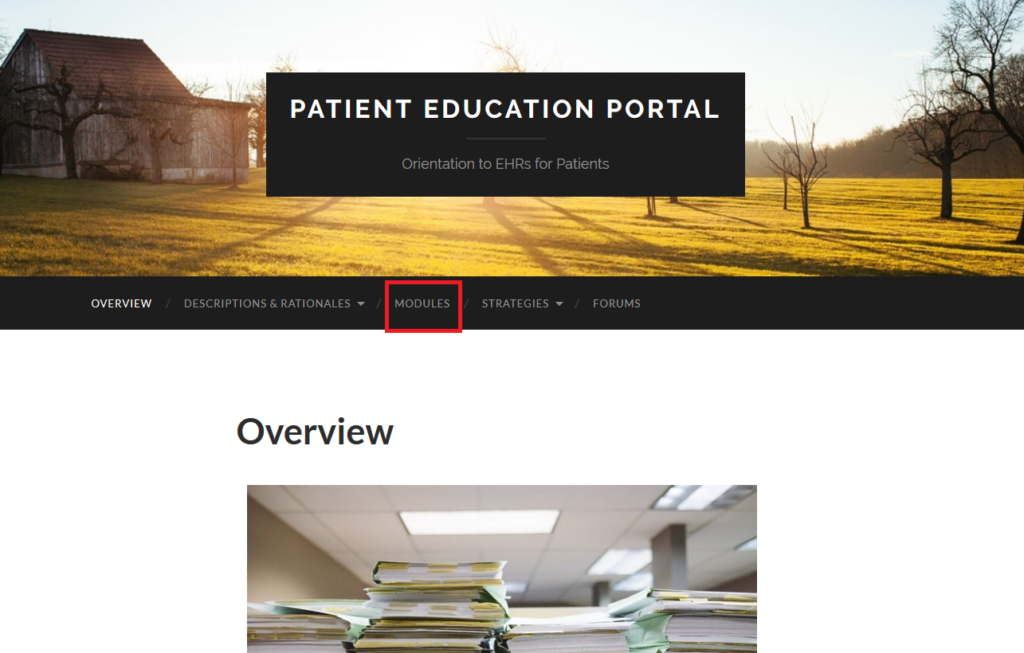Your Modules
Welcome to your module sections! Here you will find all the modules we will be working through as you progress through the orientation. Each module features one topic about electronic health records (EHRs) and if you ever need to refer back to a previous module, please click the “modules” tab on the page menu and select the desired module from our list.

Screenshot of Modules Tab
Module Orientation
Before beginning with instruction, please navigate to the module orientation page (click the paragraph title above) and complete our first lesson activity, the patient shuffle game!
Background of Health Records
What began as early as 1,600-3,000 BC to the 1990’s. all the way to present day, health records are the “documentation of a patient’s medical history and care” (Evans, 2016). Come find out which group is responsible for one of the earliest uses of health records!
Learning Outcome: Recognize how and when health records were introduced to health care and its role within hospitals and clinics.
Electronic Health Records vs Paper Records
One of the key features of Electronic health records is their move from paper records to digital or electronic records. We already have most of our records on paper though, and systems set up to organize, use, secure, and share these paper files. Why spend time and resources transitioning? As a matter of fact, electronic records provide more flexibility, faster access, and more security options, as well as potentially being cheaper to run and maintain!
Learning Outcome: Compare and contrast the advantages and disadvantages between electronic and paper-based records.
What is an Electronic Health Record
Electronic health records are digital patient-centered records that help care teams deliver the best possible patient care through timely access to medically-relevant patient information (Office of the National Coordinator for Health Information Technology, n.d.-a).
Learning Outcome: Recognize the characteristics on an electronic health record , and what it is designed to accomplish.
Benefits of Electronic Health Record Systems
Electronic health records have many benefits that positively affect patients, practitioners and healthcare costs. This section will provide opportunities to learn the advantage of implementing electronic health records in the healthcare system.
Learning Outcome: Examine the benefits of electronic health records and its advantages over paper-based records.
Electronic Health Record vs Electronic Medical Record vs Personal Health Record
Electronic health records is one of the primary health information technologies used in the management of patient medical records. However, there are other forms of electronic records that coexist with them – namely electronic medical records and personal health records. These record “formats” are all similar to each other, with electronic health records and electronic medical records even being used interchangeably, but contain slight nuances. As such, this section aims to clear up this common misunderstanding around the topic of electronic health records and provide learners with the necessary skills to determine when which “record system” is the most appropriate for use.
Learning Outcome: Compare and contrast the three “main” electronic health record solutions – Electronic Health Records, Electronic Medical Records, and Personal Health Records.
Module Wrap Up!
Now that you have a fundamental understanding of the world of electronic health records , the other forms of health record systems, and the variety of health information technologies that are at your fingertips, it is time to engage in one final activity to bring your time with this resource to a close. Navigate to our module wrap up blog and share your insights to the below prompt about your future with electronic health records and health information technology!
[PROMPT]
- How do you plan on incorporating electronic health records/health information technology as you become more involved in your healthcare?
Through this forum posting, learners will have an opportunity to demonstrate proficiency over all resource modules in a way that is relevant and stimulating of further learning (e.g. they can engage in peer discussions about topics of common interest in more detail than allowed for in the original modules). Furthermore, this forum activity will also allow our learners to engage in deep learning as they are not only regurgitating facts, which would be the case if a summative evaluation method like final examinations were used, but sharing and discussing their future plans with electronic health records/health information technology using learned concepts.